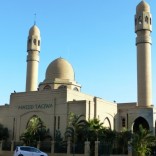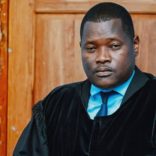Mozambique | Record-breaking IB results: Aga Khan Academy Maputo sets new standard for excellence
Bishop Luiz Lisboa admits that leaving Mozambique may be related to threats – Rádio Renascença

Pope Francis o Thursday appointed Bishop Luiz Fernando Lisboa, C.P., as bishop of the diocese of Cachoeiro de Itapemirim, Brazil, transferring him from the see of Pemba, Mozambique, and at the same time granting him the title of Archbishop ad personam'. [File photo: Rádio Renascença]
Bishop Luiz Fernando Lisboa admits that he has received threats, but underlines that he “would never” ask to leave Pemba. Could fear for his life be behind the decision to transfer him to Brazil? “We are not naive,” he replies.
D. Luiz, who was officially transferred by Pope Francis this Thursday from Pemba, in Mozambique, to Brazil, where he is from, admits that he has received threats and that concern for his life may have been behind the decision to get him out of the country.
The Pope transferred D. Luiz from Pemba, the diocese where an armed insurgency has been underway for three years, to Cachoeiro de Itapemiri, in the state of Espírito Santo, in Brazil.
The decision raised some eyebrows, given the role that D. Luiz has played in Pemba. In the current context, it cannot be understood as a rebuke, since Pope Francis made a point of elevating him to archbishop on an extraordinary basis, despite his new seat not being an archdiocese.
Also read: Just in | Cabo Delgado: Pope Francis transfers bishop of Pemba to Brazil
Speaking to Rádio Renaiscença from Brazil, where he has been since December 2020 after travelling to Rome for a private audience with the Holy Father, D. Luiz confirmed that the risks to his life may have been behind the Pope’s decision.
“It might be. I recognise the delicate situation of the moment and the Holy Father, analysing the situation in Mozambique, decided to transfer me. We are not naive, so I think it may have helped in this transfer,” he says.
The bishop also admits that he has been the target of threats during his ministry in Mozambique. “People who like to do that kind of thing never do it directly. [They do it] indirectly, to demonstrate that person is not welcome … Anyway. these things are normal. It happens to journalists, it happens to human rights activists, and it also happens to members of the Church. We are used to it, everywhere.”
“I had a few messages. I received a message or two from someone, advice from someone close. “Look, Senhor Bispo, be careful, this is not like that… You should talk like this or talk like that …” We received messages like that; these things happen. But when one is aware of one’s work and sure of what one is doing, [sure] that one is correct, one does not allow oneself to be frightened by these things.”
Also read: Watch: Exploitation of natural resources behind Mozambique’s Cabo Delgado crisis: Bishop
But D. Luiz is clear when asked if the transfer initiative came from him. “No! I would never ask to leave,” he says.
“Whoever lives in a lie doesn’t like the truth”
The region of Cabo Delgado, in the diocese of Pemba, has been the scene of great instability since 2018, which has worsened in the last year, leading to hundreds of thousands of displaced people and thousands of deaths. While it is true that the Islamic terrorists there certainly have no esteem for the bishop, D. Luiz never shied away from criticising the Mozambican authorities for their inefficiency in dealing with the crisis. Could these threats have come from the state? D. Luiz does not deny it, but says that “it is difficult to know”.
“Wherever the Church operates, it always seeks to be on the side of the truth and defend the individual human being, and that usually is usually inconvenient,” the bishop says.
“When the Church makes this defence, it speaks the truth, and seeks to defend the rights of the people. This always makes problems for the members of the Church, because those who live in lies do not like the truth, those who practice corruption do not like to be charged for it. So these people feel inconvenienced. Whether from the Government, from organisations, whoever they may be, people who occupy positions … This happens everywhere, and it also happens in Mozambique.”
Also read: In a phone call, Pope Francis comforts bishop of Mozambique’s Pemba Diocese amid crisis – ACI Africa
D. Luiz concedes that there is even a tradition of persecuting the clergy in Mozambique for defending the most vulnerable, and that he probably will not be the last. “The Episcopal Conference of Mozambique has always had a very clear position in defence of the population and human dignity, and many bishops throughout the history of the Church of Mozambique have been accused of this or that. Some have been persecuted, some have even been expelled. But the Church continues. One bishop comes out, another comes in, that’s normal. ”
Successor is is prepared
In the immediate future, D. Luiz will be succeeded by the auxiliary bishop of Maputo, D. António Juliasse Sandramo.
The choice leaves D. Luiz satisfied, and he describes D. António as “fearless”.
“He is a very well prepared person, and I think he can meet the challenge. He knows more about the reality and the history than I do. And he is fearless. I don’t think he will have any problems. ”
“I think he will do a good job until the bishop who will stay there is appointed, which always takes a few months. We hope it doesn’t take long. But I think that he can continue the work and continue to give the assistance that the Church has given to the displaced ,” D. Luiz Fernando Lisboa concludes.
The new bishop of Cachoeiro de Itapemiri says that he still wants to return to Mozambique to hand over the portfolio to D. António, and hopes to take office in his new diocese, which has been without a bishop since 2018, in late March or April.
By Filipe d’Avillez
Bishop of Pemba, in #Mozambique, admits that threats to his life may have been behind @Pontifex decision to move him out of the country. https://t.co/cOJyBbfvVa@Renascenca @DelgadoCabo @emorier
— Filipe d’Avillez (@Favillez) February 11, 2021












Leave a Reply
Be the First to Comment!
You must be logged in to post a comment.
You must be logged in to post a comment.